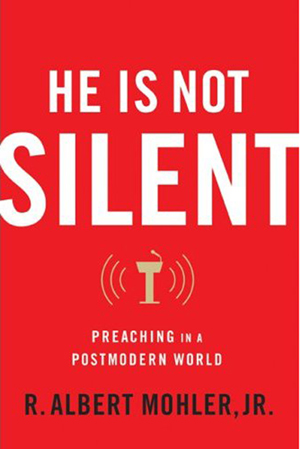 He Is Not Silent: Preaching in a Postmodern World
He Is Not Silent: Preaching in a Postmodern World, written by Albert Mohler, the president of the Southern Baptist Theological Seminary, confused me in several ways, the first of which being that the subtitle (‘preaching in a postmodern world’) seemed to indicate the book was about preaching to a postmodern world or generation. But only one chapter deals with postmodernism and its one of the very last chapters in this book.
In reality, this book is a passionate plea to return to expository preaching with the gospel at its very core. That in itself is a worthy message, but not necessarily related to postmodernism but to any age. It’s a message I don’t disapprove of, though the writer’s aversion to topical preaching was a bit black-and-white. It’s just that I expected a different book, based on the title. I also expected a more practical book, whereas this book is more theoretical in presentation. It gives very strong statements and recommendations, but in most of the cases not the practical ways to execute them.
What was also curious was the question with which the writer ended the epilogue of the book, a heartfelt praise of Spurgeon. Mohler asked ‘Where are the Spurgeons of this generation?’ That question was somewhat surprising, since Mohler spends a lot of time in the first chapters on denouncing in every possible way topical preaching and a focus on the methods instead of on the content. One cannot accuse Spurgeon of lacking in content, but even Mohler himself admits that Spurgeons’ methods and style were revolutionary and very much adapted to his culture and his audience. To call upon the Spurgeons of this generation therefore seems to me to call upon a focus on delivery, style and methods as well as on content.
Mohlers’ deep passion for Biblical preaching is clear from this book and he is certainly to be recommended for his dedication in this area. I do agree with him that this generation, like any other generation, needs to hear the Gospel loud and clear. I also do agree with him that Scripture should always be at the very core of our sermon and that we should ‘make a beeline for the cross’ as Spurgeon put it ever so elegantly. I do however have a bit of a problem with the black-and-white way in which Mohler describes expository preaching versus any other form.
Here’s a quote from the foreword by John MacArthur:
“they And two lines further he says: “sound biblical preaching has become an extremely rare commodity.” First of all, I think this is too generalizing (‘many of…’ rather than ‘some of…’, ‘extremely rare’ rather than ‘somewhat rare’)). Secondly, he attributes false motives to these supposed evangelical church leaders and that’s not fair. They may be wrong, you may not agree with them, but at least give them the benefit of the doubt when it comes to motives. They just have a different view on what constitutes effective preaching would be my guess. Mohler himself speaks of “wanton experimentation in many pulpits.” As if Spurgeon wasn’t experimenting in the sense that his style was completely different than that from his contemporaries! He was attacked for it in his days and even called ‘vulgar’ for using too common day examples and illustrations, as Mohler describes himself. Mohler also denounces “preachers who have rushed to incorporate visual technology and media in the preaching event” and concludes that “the visual is often directed towards a very narrow slice of human experience, particularly focused in the affective and emotional aspects of our perception.” Again, this seems to be too big a generalization to me. The writer’s conclusion is that ‘contemporary preaching’ suffers from: To me, the evidence for all these sweeping statements is rather thin and mostly a matter of subjective interpretation. To use a management terms: many of his complaints aren’t mutually exclusive with biblical, expository preaching even. I’d say that it’s possible to use modern technology in a sermon and still be biblically sound and rich in content. That being said, I did learn a lot from this book. Mohler’s exhortation to preach the Bible’s big story is a point I completely agree with. His plea for biblical preaching is also one that resonated with me. He has sharp insights on the role or the preacher and the importance of the sermon in general. The chapter on ‘Preaching to dry bones’, an analogy between Ezekiel’s experiences and current day preaching was very moving and encouraging indeed. I just wish he’d presented his passionate love for biblical preaching in a positive way, instead of complaining almost bitterly about ‘contemporary preaching’. That would have given him more credibility with me, that’s for sure.
Leave A Comment